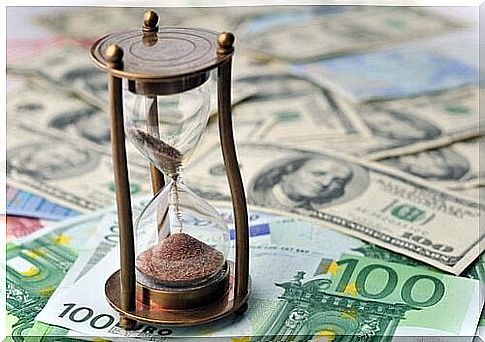Time Or Money? These Are Happy People’s Answers

If you had the choice between a higher salary or a shorter working day, which one would you choose? Your choice between time or money depends in part on how happy you are. A study published by the journal Social Psychological and Personality Science revealed that happy people tend to choose more time over more money.
According to a study by Princeton University, earning up to 475,000 a year and using it well can affect your subjective level of happiness. But beyond that, can you be happier by making more money, or would it be better to have more time to enjoy with your loved ones and yourself? Let’s see.
Time or money: The relationship between money and happiness has a limit
Daniel Kahneman, psychologist and winner of the Nobel Prize in Economic Science in 2002, and Angus Deaton, winner of the same Nobel Prize in 2015, analyzed more than 450,000 responses and found that there is a positive correlation between income and self-reported happiness.
However, participants’ subjective assessment of their daily emotional state flattens out after a certain income level. In other words, there is a point where making more money will not make you happier. The relationship between money and happiness reaches a plateau after a salary of 475,000.

All of this is to say that money can buy happiness to some degree, but there is a limit. When you exceed it, your level of satisfaction will not increase on the basis of money. In fact, it may even fall.
“My dream is like Picasso’s: to have a lot of money, but to live quietly like the poor.”
-Fernando Savater-
Time or Money: Can Money Buy Happiness?
Various studies suggest that money cannot buy happiness, just short-lived peaks of pleasure. This can be explained by the psychological concept of habituation. In the beginning, it is exciting to make a lot of money, but over time, the sensation begins to subside. You get so used to it and you go back to the level of happiness you were at before.
Total joy depends not only on what you do but also on how you interpret it. And how to define happiness to begin with.
Likewise, success is associated with having more of everything: more money, more things, more recognition. And it makes sense – we’ve already talked about how well-spent money can help move you toward happiness. But what about time? The stereotypical successful person works constantly and hardly has time to enjoy things like spending time with friends and family.
What joy is success, money or recognition if you can not enjoy it? If the goal is to be happy , why not spend more time doing what really makes you feel alive ? The answer may be that we do not know how or that we have not even thought about it…
“He who is of the opinion that money will do everything may well be suspected of doing everything for money.”
-Benjamin Franklin-
Time or money: Do you know how to use your time to be happy?
The study published in the Social Psychological and Personality Scienc e asked nearly 4,500 people whether they valued money more than time, in order to be happy. 64% indicated that they preferred money.
Despite their self-reported preferences, the study also found that people who cared more about time turned out to be happier. When asked the same question a year later, 25% of the participants who had originally chosen money changed their minds. They chose time.
The results of the study showed that between two people in similar circumstances, the person who decided that time was more important than money would be happier than the one who chose money. And it’s not the only study of its kind.

A study from the University of British Columbia also found that valuing time over money is associated with higher levels of happiness. This is especially true when earning money involves long working days.
Time starts to become more prioritized as people get older. It makes sense as every second that passes becomes so much more valuable. Today, younger people seem to have taken note, especially millennials, born between 1980 and 1995. According to a 2013 study by PricewaterhouseCoopers, millennials prefer more leisure and work-life balance, over a higher salary.
Millennials believe that working is a means to stability and well-being, but it is not the only way.
The main conclusion from these studies is that money can help you get happy up to a certain point, but there is a limit . We need to know how to spend our time well, not just our money.









